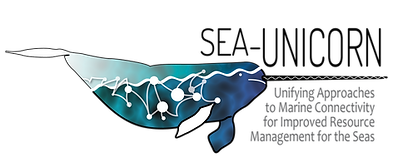
Host & sponsors

Organizers
The European COST Action SEA-UNICORN
Positioned at the Science-Society-Policy interface, the COST Action CA19107 "Unifying approaches to Marine Connectivity for Improved Resource Management for the Seas" SEA-UNICORN is an international networking initiative endorsed as an official action of the UN Ocean Decade (project 221, affiliated to the Marine Life 2030 program). It gathers over 350 scientists and marine stakeholders in 42 countries (mainly in Europe, but also beyond), around the common aim of advancing scientific knowledge in this field, contributing to global sustainable development, and public training and information.


The French research consortium Océans et Mers OMER
The French research consortium (GDR) OMER, funded by the CNRS, is structured into several Working Groups, each on a different cross-disciplinary and interdisciplinary research theme. Among them, the O-CONNECT Working Group is in charge of coordinating French research efforts on the study of marine functional connectivity and its use for improved resilience of coastal and marine socio-ecosystems.
The Ocean Knowledge Action Network OceanKAN
OceanKAN is a modern, cross-network community that connects people from around the globe who are working to bring together scientists and stakeholders for the co-design of ocean science. In this network, people share knowledge and support each other to better co-design ocean science, and address the many other challenges and opportunities that come from using science to inform ocean decision-making. The Ocean KAN works closely with the Marine Life 2030 program of the UN Ocean Decade and is part of the Future Earth Network.

Local Host
The joint research unit MARine Biodiversity Exploitation &
Conservation MARBEC
2
Located in the South of France, at the University of Montpellier, and in the Ifremer stations of Sète and Palavas-les-flots, MARBEC is a research joint unit gathering nearly 300 permanent research scientists, from 5 public French organizations (CNRS, IRD, Ifremer, Montpellier University and INRAE). It concentrates multiple scientific skills and knowledge on the study of marine biodiversity and its use, to help protect it and support the sustainable use of marine resources.



MARBEC’s research extends from molecules to ecosystems, from microorganisms to megafauna and from the coast to the open sea, with emphasis on the sustainable use of marine biodiversity. It mainly focusses on the biodiversity and health of Mediterranean coasts and lagoons, and the sustainability of their fisheries and aquaculture. Another major research focus is the sustainable use and conservation of biodiversity in tropical ocean basins, in collaboration with partner institutions in Latin America, West and Southern Africa, the Indian Ocean and South East Asia. MARBEC contributes to the work of IPBES and of public-policy-making bodies, in France and abroad. The research unit also trains young researchers from all over the world, hosting nearly 80 doctoral and post-doctoral students from ~20 countries (including southern nations) each year, and its staff teach a variety of disciplines in ecology, statistics and environmental sciences, in France and abroad.
Sponsors


LabEx



Endorsed By












